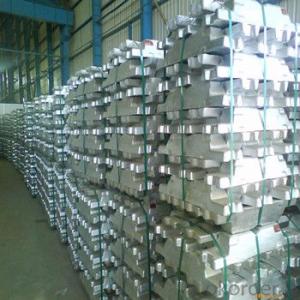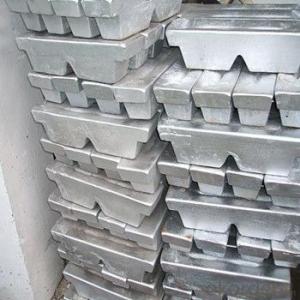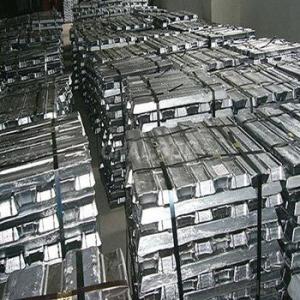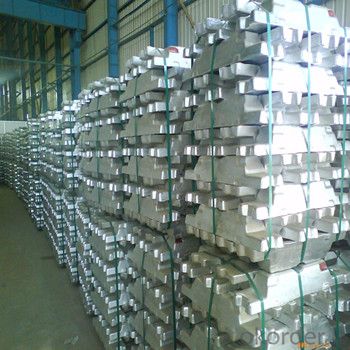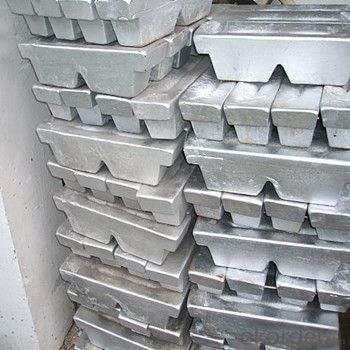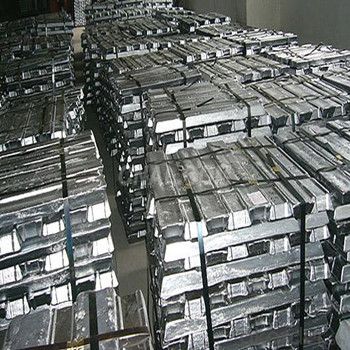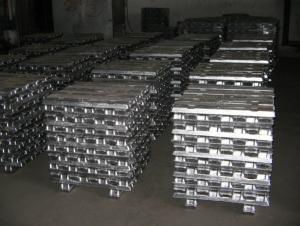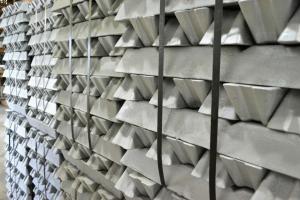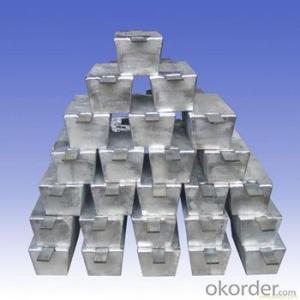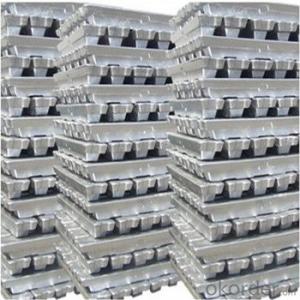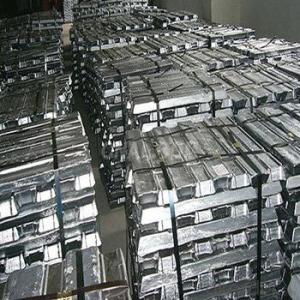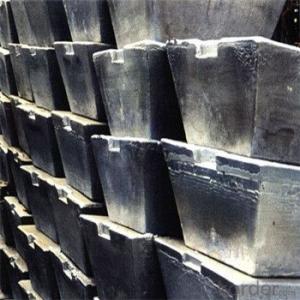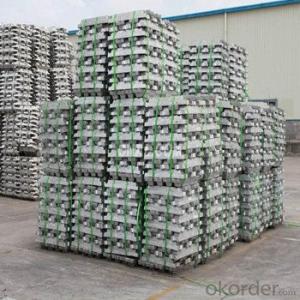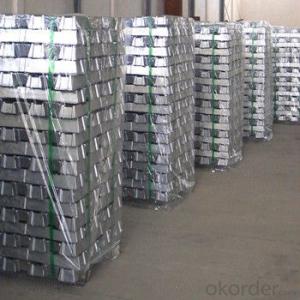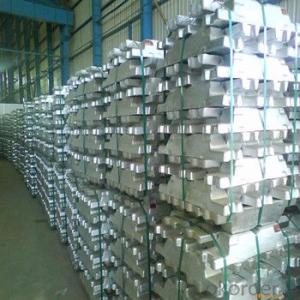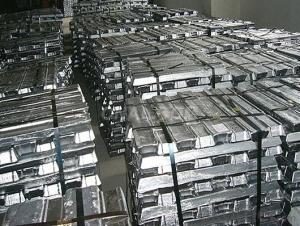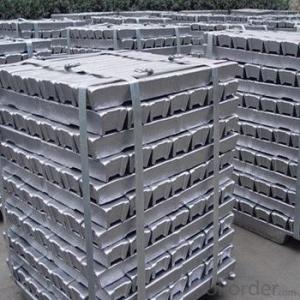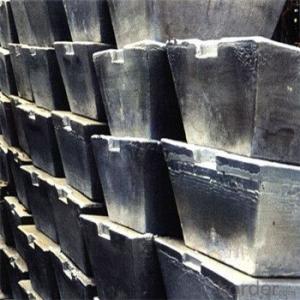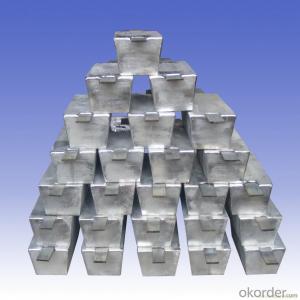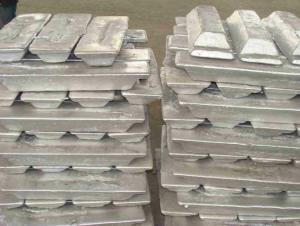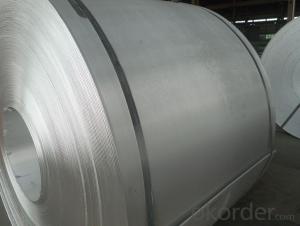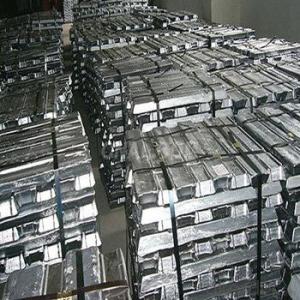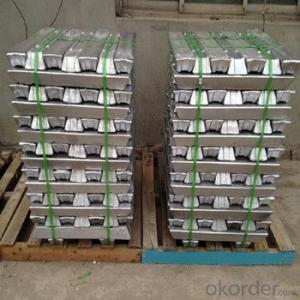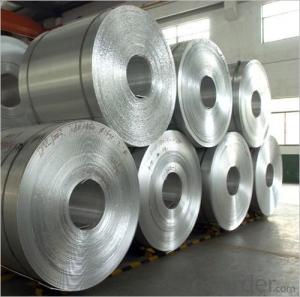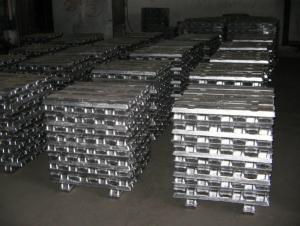Aluminium Ingots 99.7% Made By China Professional Manufacturer
- Loading Port:
- China main port
- Payment Terms:
- TT OR LC
- Min Order Qty:
- 1000 m.t
- Supply Capability:
- 10000 m.t/month
OKorder Service Pledge
OKorder Financial Service
You Might Also Like
Pure Aluminum Ingot Used for Industry
1.Structure of Aluminum Ingot Description
An ingot is a piece of material, usually metal, that is cast into a shape suitable for further processing. Insteelmaking, it is the first step among semi-finished casting products. Ingots usually require a second procedure of shaping, such as cold/hot working, cutting, or milling to produce a useful final product. Non-metallic and semiconductor materials prepared in bulk form may also be referred to as ingots, particularly when cast by mold based methods.
2.Main Features of the Aluminum Ingot
•High Purity
•High strength
•Fast melting
•Best price
•Good after-service
3. Aluminum Ingot Images
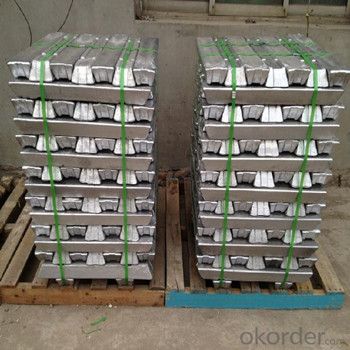
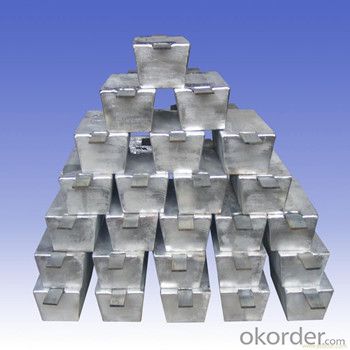
4. Aluminum Ingot Specification
Grade | Chemical Composition % | |||||||||
Al≥ | impurities ≤ | |||||||||
Si | Fe | Cu | Ga | Mg | Zn | Mn | others | Sum | ||
Al99.9 | 99.90 | 0.50 | 0.07 | 0.005 | 0.02 | 0.01 | 0.025 | - | 0.010 | 0.10 |
Al99.85 | 99.85 | 0.80 | 0.12 | 0.005 | 0.03 | 0.02 | 0.030 | - | 0.015 | 0.15 |
Al99.7 | 99.70 | 0.10 | 0.20 | 0.010 | 0.03 | 0.02 | 0.030 | - | 0.030 | 0.30 |
Al99.6 | 99.60 | 0.16 | 0.25 | 0.010 | 0.03 | 0.03 | 0.030 | - | 0.030 | 0.40 |
Al99.5 | 99.50 | 0.22 | 0.30 | 0.020 | 0.03 | 0.05 | 0.050 | - | 0.030 | 0.50 |
Al99.00 | 99.00 | 0.42 | 0.50 | 0.020 | 0.03 | 0.05 | 0.050 | - | 0.050 | 1.00 |
5.FAQ of Aluminum Ingot
We have organized several common questions for our clients,may help you sincerely:
①How about your company?
A world class manufacturer & supplier of castings forging in carbon steel and alloy steel,is one of the large-scale professional investment casting production bases in China,consisting of both casting foundry forging and machining factory. Annually more than 8000 tons Precision casting and forging parts are exported to markets in Europe,America and Japan. OEM casting and forging service available according to customer’s requirements.
②How to guarantee the quality of the products?
We have established the international advanced quality management system,every link from raw material to final product we have strict quality test;We resolutely put an end to unqualified products flowing into the market. At the same time, we will provide necessary follow-up service assurance.
③How long can we receive the product after purchase?
In the purchase of product within three working days, We will arrange the factory delivery as soon as possible. The pecific time of receiving is related to the state and position of customers.Commonly 7 to 10 working days can be served.
- Q: How to refine aluminum ingot
- You need a basic open hearth is heating aluminum cans, but is not the direct melting aluminum ingot what meaning, that thing in a lot of impurities, but also remove the magnesium, zinc, manganese and other elements, these processes need professional personnel, so difficult to master.
- Q: How is aluminium ingot made?
- Aluminium is a silvery white metal, second only to oxygen and silicon in the earth's crust, and ranks third. The density of aluminum is small, only 34.61% of iron and 30.33% of copper, so it is also called light metal. Aluminum is the world's output and consumption of ferrous metals only next to steel. The density of aluminum is only about 2.7103g/cm3, about 1/3 of the density of steel, copper or brass.
- Q: Could you tell me how to calculate the value of aluminum material? By weight or by length or by other means?
- According to the weight calculation, international trade every day aluminum prices refresh, at this stage in 17 thousand tons, finished to calculate the cost of processing, such as: Aluminum Alloy window, this is an aluminum extrusion, extrusion processing costs to add 4500 tons.
- Q: How much is a ton of aluminium ingot on the market?
- According to Hongkong, Ming Pao reported that the snowstorm on the Chinese caused economic losses temporarily still difficult to measure, but the shortage of electricity, fuel supply also affect the industrial production, such as China aluminum smelters, Hunan nonferrous metals to limit production shutdown, Steel Corp, electric power company is facing the coal supply problems.
- Q: What is the melting point of aluminum ingots?
- The melting point of aluminum ingots is approximately 660 degrees Celsius or 1220 degrees Fahrenheit.
- Q: Casting aluminum ingot, environmental protection has those requirements?.
- Our company can according to the user's site conditions and the need to select the appropriate cooler for the user, there are several types of dust removal system commonly used: natural air cooling + bag, air cooler + bag.
- Q: How long can aluminum ingots be stored?
- Aluminum ingots can be stored indefinitely as long as they are kept in a dry and well-ventilated environment to prevent corrosion.
- Q: It can be dissolved aluminum cans, aluminum ingots, need what equipment?
- It is difficult to control the impurities. The impurity is difficult to control, and the purity is difficult to meet the required index, because the ingot needs the casting machine.
- Q: What are the health risks associated with working with aluminum ingots?
- Certain health risks can be associated with working with aluminum ingots due to the potential exposure to various hazards. The following are some health risks that are commonly associated with working with aluminum ingots: 1. Inhaling aluminum particles: There is a risk of inhaling fine aluminum particles during the handling and processing of aluminum ingots. Prolonged exposure to aluminum dust or fumes can lead to respiratory problems such as bronchitis, pulmonary fibrosis, or even lung cancer. 2. Irritation of the skin and eyes: Direct contact with aluminum ingots or its dust can cause skin irritation, redness, and rashes. It may also cause eye irritation, resulting in redness, itching, or a burning sensation. 3. Potential neurological effects: Chronic exposure to aluminum, especially through inhalation or ingestion, has been linked to possible neurological effects. Although the exact mechanisms are not fully understood, there is some evidence suggesting a connection between aluminum exposure and the development or progression of neurodegenerative diseases, such as Alzheimer's disease. 4. Occupational asthma: Exposure to aluminum dust or fumes can trigger or worsen asthma symptoms in individuals who are already prone to respiratory conditions. This can lead to difficulties in breathing, wheezing, coughing, and chest tightness. 5. Heavy metal toxicity: Aluminum is classified as a heavy metal, and excessive exposure can result in heavy metal toxicity. Symptoms of aluminum toxicity may include gastrointestinal issues, bone pain, muscle weakness, and potential damage to the nervous system. To minimize these health risks, it is crucial to implement appropriate safety measures and adhere to proper protocols when working with aluminum ingots. This includes wearing personal protective equipment (PPE) such as gloves, goggles, and respiratory masks, ensuring adequate ventilation in the workplace, and regularly cleaning to reduce the accumulation of aluminum dust. Additionally, individuals working with aluminum ingots are advised to undergo regular medical check-ups and monitoring to detect any potential health issues at an early stage.
- Q: How can I extract aluminium ingots from cans?
- The most basic is that you need an open hearth, is heating aluminum cans, but direct melt is not what the meaning of aluminum ingot
Send your message to us
Aluminium Ingots 99.7% Made By China Professional Manufacturer
- Loading Port:
- China main port
- Payment Terms:
- TT OR LC
- Min Order Qty:
- 1000 m.t
- Supply Capability:
- 10000 m.t/month
OKorder Service Pledge
OKorder Financial Service
Similar products
Hot products
Hot Searches
Related keywords
